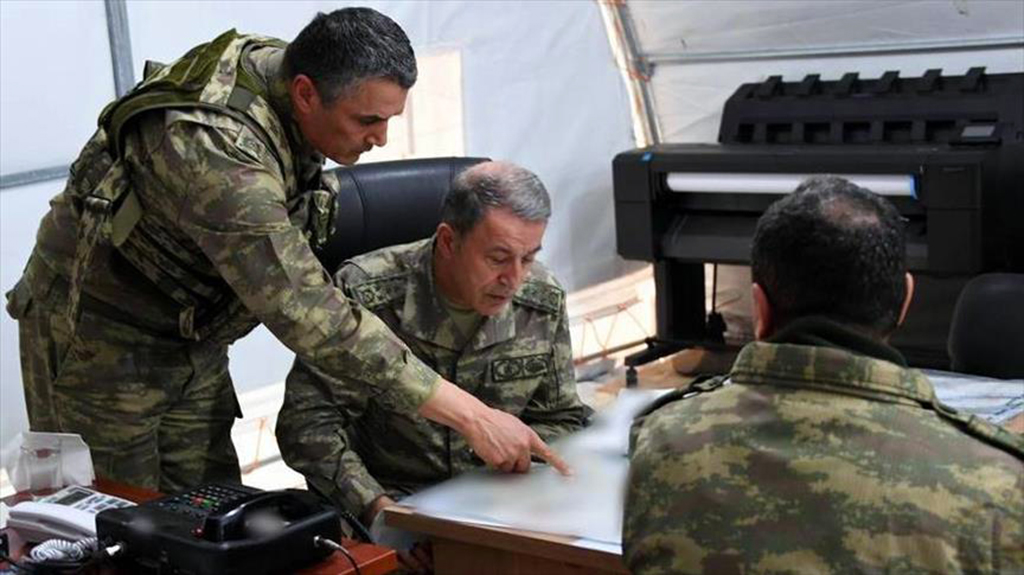
Europe must appreciate Turkey's commitment to counterterrorism
Under a new counter-terrorism policy, Turkey is committed to neutralizing national security threats in Syria and Iraq whether European leaders like it or not
Share
Operation Olive Branch, which Turkey launched on Jan. 20 in northwestern Syria, has defied expectations. In recent weeks, the designated terrorist organization PKK and its Syrian branch, the People's Protection Units (YPG), which rose to "fame" during the counter-Daesh campaign, suffered heavy losses against the Turkish Armed Forces (TSK) and the Free Syrian Army (FSA). Within weeks, the Turkish-backed moderate opposition gained control over the Afrin city center.
Forming their first line of defense at the Turkey-Syria border and entering a conventional war with Turkey and the FSA forces was the PKK/YPG's biggest mistake. Despite crying wolf about civilian casualties, the group failed to receive due support from Europe and the United States. Whatever support Washington and Brussels were willing to offer, in turn, could not change Turkey's mind.It is no secret that many Western governments expected Afrin to be "Turkey's Vietnam" when Operation Olive Branch kicked off. Over the following weeks, European media outlets and the European Parliament repeatedly called on the Turkish government to suspend the incursion and withdraw its forces from northwestern Syria. U.S. officials, in turn, have been trying to reach some kind of agreement with the Turks over Manbij. To be clear, the Turkish takeover of Afrin and President Recep Tayyip Erdoğan's commitment to the counter-PKK campaign represent the cornerstones of Turkey's Syria policy. Having refrained from resorting to hard power in Syria for five years, Ankara's current level of determination has been underestimated by Berlin, Paris and Washington.
The Turkish government made a strategic decision to neutralize cross-border national security threats within the borders of Syria and Iraq. This step was facilitated by Turkey's rapprochement with the Russian Federation. Today, preventing the establishment of a PKK-controlled statelet across its southern border represents Turkey's top priority. It's been some time since the Turks decided to play an active role in the Middle East and resort to hard power, if necessary, to address that existential threat. As such, Turkey does not worry about being charged by the German or French media with "colonizing northern Syria" and "removing the Kurds from the area." Nor will the European Parliament's call weaken the country's resolve in the fight against the PKK/YPG.
Last week, the Turkish president sent a clear message to European governments and the United States in his address to the AK Party's provincial convention in Erzurum. He said that the Turkish Armed Forces would proceed to reinforce their observation posts in Idlib and advance toward Manbij once they gained control over Afrin. Urging the U.S. to evacuate Manbij, President Erdoğan provided a strongly-worded response to the European Parliament: "Since when do you tell this nation what to do? You should keep your opinions to yourself. We have been hosting 3.5 million Syrians for seven years. Had we opened the borders and sent them to Europe, you would have been looking for a hole to hide in. You begged us not to open our borders. We treated you kindly, but you clearly don't appreciate that."
Those words were a clear reflection of Turkey's frustration with Europe's lack of support in its fight against terrorism. The Turks are unhappy with the lack of appreciation by European leaders of Turkey's contributions to European security and stability — including with regard to the refugee crisis.
But the Europeans are worried about something else. Against the backdrop of Operation Olive Branch, the PKK militants, whom European authorities have ignored for years, posed a serious threat to public safety. Unable to prevent Turkey's military incursion in northwestern Syria, PKK supporters channeled their anger on the streets of Europe. To be clear, their anger doesn't exclusively target the Turkish community and Turkish nongovernmental organizations in Germany. They also place at risk German institutions and public order. As such, this isn't just about arson attacks against Turkish mosques anymore. Encouraged by radical leftists, PKK militants took to the streets of Europe to unleash a new wave of radicalization with links to Islamophobia and right-wing extremism.It is important to recall that Turkey has just started cracking down on PKK/YPG networks in Syria and Iraq. Unable to keep PKK militants under control, European countries are likely to experience a significant rise in violence. The answer isn't to call on the Turks to stop fighting terrorism. Quite the contrary, European leaders must cooperate with their Turkish counterparts against terrorist groups.
[Daily Sabah, 20 March 2018]
Tags »
Related Articles






